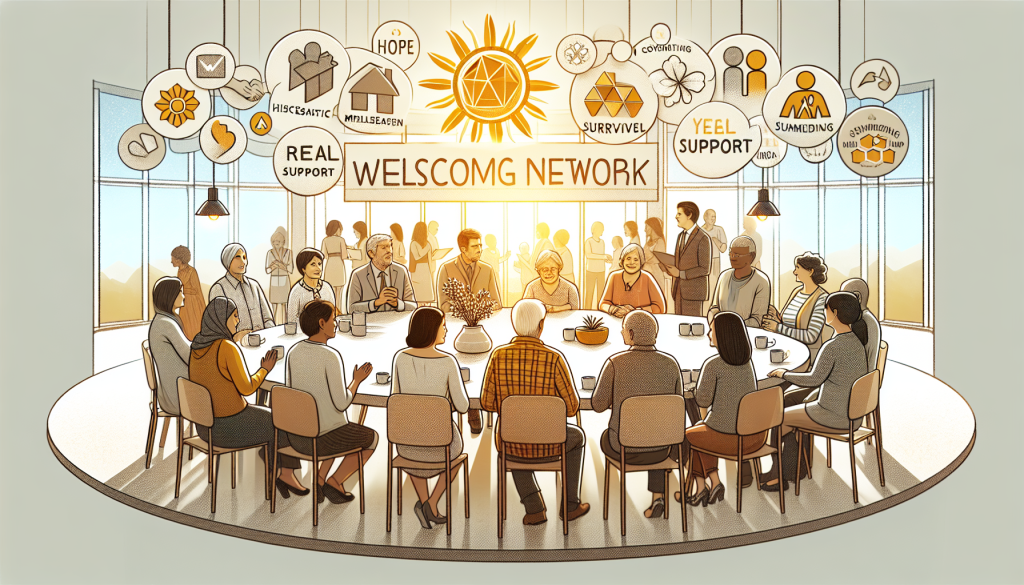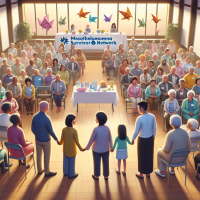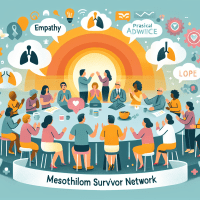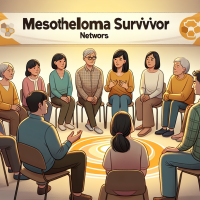Mesothelioma Survivor Network Events: A Compassionate Path to Hope
Hello, I’m a registered oncology nurse with over 10 years of experience, and I truly understand the challenging journey that comes with a Mesothelioma diagnosis. In this post, I share my insights on Mesothelioma survivor network events—an invaluable resource for patients, families, and caregivers. Together, let us explore actionable steps, nurturing community support, and comprehensive medical insights designed to help you feel less alone as you navigate this path.

Understanding Mesothelioma and Its Impact
Mesothelioma is a rare cancer that primarily affects the lining of the lungs, abdomen, or heart. When someone is diagnosed, the emotional impact can be overwhelming. I have seen how uncertainty, physical challenges, and emotional distress interweave, making each day a brave battle. It is in these moments that joining a support network and attending survivor events can provide not only the latest medical information but also a shared sense of resilience.
For those interested in Mesothelioma survivor network events, know that these gatherings aim to bring together individuals who understand the unique experiences of living with Mesothelioma, fostering an environment of empathy, shared wisdom, and proactive coping strategies.
A supportive community gathering, symbolizing hope and resilience.
Diagnosis and Staging: Your Guide to Understanding
When a Mesothelioma diagnosis is given, the medical journey often starts with a series of diagnostic tests. Procedures such as thoracoscopy or thoracentesis play a pivotal role in confirming the diagnosis. Here’s a brief look at what these tests involve:
- Thoracoscopy: A minimally invasive procedure in which a slender instrument is inserted into the chest to examine the pleura and obtain tissue samples.
- Thoracentesis: A procedure to remove fluid from the space between the lung and chest wall to analyze for malignant cells.
Following diagnosis, understanding the staging of the cancer is essential. The stages of Mesothelioma, ranging from 1 to 4, provide insight into how far the cancer has spread and guide treatment decisions:
- Stage 1: The cancer is localized, and treatment may focus on surgery combined with chemotherapy or radiation.
- Stage 2: Cancer has spread to neighboring tissues, often requiring a multimodal treatment approach.
- Stage 3: The disease has advanced further, necessitating aggressive treatment to manage symptoms.
- Stage 4: Widespread metastasis limits treatment options to palliative care with a focus on quality of life.
Treatment Options and Moving Forward
Understanding your treatment options is a crucial part of your journey. While there is no one-size-fits-all solution, here are some common treatment modalities:
- Surgery: Often the first step for early-stage cancers, surgery aims to remove as much of the tumor as possible.
- Chemotherapy: Uses drugs to target and kill cancer cells; it can be used in combination with other treatments.
- Radiation Therapy: Helps to shrink tumors and provide symptom relief.
- Immunotherapy: An emerging treatment that boosts the immune system to fight cancer.
Each treatment plan is carefully tailored by a team of experts. It’s vital to communicate openly with your healthcare team and discuss all available options. If you’re looking for deeper insights, consider reading our Mesothelioma Treatment Options guide which further elaborates on each method with up-to-date research and compassionate advice.
Emotional Support and Coping Strategies
One aspect that often receives less attention is the emotional toll of Mesothelioma. I believe that healing is as much about managing emotional well-being as it is about physical healing. Attending Mesothelioma survivor network events can be a turning point. Here are some strategies that have helped many, including myself, in facing this challenge:
- Acknowledge Your Emotions: Embrace both the good and bad days. It’s okay to feel overwhelmed and to seek out counseling or group therapy.
- Mindfulness and Meditation: Simple breathing exercises or guided meditation sessions can help manage anxiety and stress. I often incorporate a few minutes of deep breathing into my daily routine.
- Stay Informed: Knowledge is power, but ensure the sources are trustworthy. Reputable sites like the National Cancer Institute and American Cancer Society provide balanced information.
- Engage with Support Groups: Sharing your story with others who truly understand can be enormously healing. Consider joining local or online support groups dedicated to Mesothelioma.
A Personal Reflection
Words of Encouragement I’ve Found Helpful: “Every step, no matter how small, is a victory. Your strength is evident in every challenge you face, and together we build a community of hope and healing.”
– A Fellow Survivor and Caregiver
The Role of Mesothelioma Survivor Network Events
These events are more than just gatherings. They are safe spaces where survivors, patients, families, and caregivers can exchange personal stories, learn about the latest advancements, and build a support network that feels like a second family. When I attend these events, I find that the shared experiences not only provide comfort but also empower me to take proactive steps in my journey.
In these events, you might find:
- Informative Sessions: Led by medical experts discussing diagnosis, treatment options, and future research.
- Interactive Workshops: Focused on emotional well-being, mindfulness practices, and effective communication with your healthcare team.
- Networking Opportunities: Meet other survivors and caregivers who truly understand the struggles and triumphs associated with Mesothelioma.
Actionable Steps to Get Involved
If you’re considering attending a Mesothelioma survivor network event, here are some practical steps:
- Research Local Events: Use keywords like ‘mesothelioma support groups’ and ‘mesothelioma survivor events’ to find gatherings near you, including annual survivor network events.
- Verify Credibility: Confirm events are hosted by or in collaboration with reputable organizations such as the Mesothelioma Applied Research Foundation.
- Prepare Your Questions: Before attending, jot down any questions or topics you wish to discuss with experts and peers. This may include questions on staging, treatment options, and coping strategies.
- Bring a Support Person: Having a friend or family member with you can offer additional comfort and help in processing information.
An image capturing the warmth of community support during a Mesothelioma event.
Integrating Medical, Emotional, and Community Support
In my years as an oncology nurse, I’ve learned that healing requires a holistic approach. Beyond attending events and connecting with peers, consider these additional recommendations:
- Consult with Experts: Regularly speak with your oncologist about your treatment plan and any emerging symptoms.
- Utilize Online Resources: Websites like the American Cancer Society and Mesothelioma Applied Research Foundation offer comprehensive information and updates on clinical trials.
- Patient & Caregiver Resources: Explore additional articles on our website, such as our in-depth posts on Mesothelioma Support Groups and Patient Resources.
Understanding and Managing the Emotional Journey
Being diagnosed with Mesothelioma or supporting someone who is can bring about intense emotional challenges. Managing anxiety, fear, and grief is just as critical as managing physical symptoms. I encourage you to consider the following practices:
- Express Yourself: Sometimes writing down your feelings or speaking with a counselor can provide significant relief. Journaling can serve as a private space to process your emotions.
- Build a Routine: Establishing daily routines that include self-care can create a sense of stability during tumultuous times.
- Join a Safe Space: Consider online forums or support groups where you can express your fears and share your success stories in a non-judgmental environment.
Words of Encouragement From My Heart to Yours
Remember, while the journey may be difficult, you are not walking alone. We share this path, and together, our strength multiplies. Every community meeting, every shared smile, and every tear is a step toward hope.
– A Caring Oncology Nurse
Information on treatment guidelines is current as of May 2025. I hope that these reflections, actionable advice, and shared experiences provide you with a renewed sense of determination and support.
Your Next Steps: Where to Find More Help
Before you make any decisions about treatment or support, please consult with your healthcare provider. My insights are based on years of working closely with patients and their families, and while I offer compassionate guidance, every medical journey is unique.
If you’re looking for further assistance, consider these next steps:
- Join a Survivor Event: Find local Mesothelioma survivor network support events by searching online or asking your care team for recommendations.
- Engage with Community: Reach out to online support groups to share experiences and explore both emotional and medical resources.
- Continuous Learning: Keep updated with changes in treatment and research by regularly checking reputable medical websites.
Always remember, this community is here for you, and every effort is made to ensure that no one feels isolated or unsupported. Transparency is core to our mission—our informational support is provided at no cost, funded by ethical partnerships that support valuable, trusted resources.
Thank you for trusting me to guide you through this difficult journey. I genuinely care and am here to lend my knowledge and share in your hope for better days ahead.






